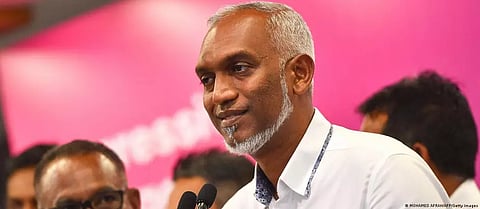

Murali Krishnan
MALDIVES: Mohamed Muiz scored over 54% of the votes in last week’s presidential runoff, raising the geopolitical stakes for India as the Maldives could see a pivot toward Beijing. Muiz will take the oath of office on November 17, and his first term will likely see a shift in both domestic governance and foreign policy in the Indian Ocean archipelago state.
More importantly, Muiz’s win is likely to force the governments of India and China to prepare for a new chapter in their diplomatic ties with the Maldives. A certain amount of unease felt in New Delhi was primarily prompted by Muiz’s People’s National Congress, and its coalition partner, the Progressive Party of Maldives, which ran on an “India Out” platform.
India, which is home to many Maldivians, considers the Maldives to be located in its area of influence — while China included the island nation as a part of its Belt and Road Initiative (BRI) during the 2013-18 rule of President Abdulla Yameen.
Muiz has promised to remove Indian troops from the Maldives and balance the country’s trade relations, which he said were heavily in India’s favor.
This was in sharp contrast to incumbent President Ibrahim Mohamed Solih — a known India acolyte — who had committed the Maldives to an “India First” approach and called New Delhi as the first responder in times of crises.
Arindam Bagchi, a spokesperson for India’s Foreign Ministry, said the countries would need to work closely on regional security challenges. “The focus of our partnership with the Maldives has always been on capacity building and working together to address our shared challenges and priorities, including security challenges and priorities,” Bagchi said.
China has been undertaking infrastructure projects and making significant economic investments in the Indian Ocean region as part of the BRI.
The initiative will enable China to oversee the construction of new roads, ports and pipelines that will run through 65 countries. Adjacent to routes used for China’s energy supplies, the strategic maritime location of the Maldives will benefit Beijing.
Former diplomats and academics pointed out that India’s financial help to Maldives has been generous over the years and that India has been working on some important infrastructure projects.
In November 2022, India handed the Maldives $100 million to ease the country’s financial challenges. Muiz’s election victory suggests an intensification of the India-China rivalry in South Asia, Srikanth Kondapalli, the dean of Jawaharlal Nehru University’s School of International Studies, told DW.
“During his presidency, Yameen cultivated close ties with China and adopted an anti-India stance,” said Kondapalli, who questioned whether Muiz would maintain his “India Out” policy. “Muiz will have to balance several interests and, more significantly, provide stable governance,” Kondapalli said.
Though some Indian troops may be withdrawn as a symbolic victory for Muiz, New Delhi will have to maintain its engagement with the new administration and ensure that its interests are not compromised by China’s increasing clout in the Maldives.
P Sahadevan, a professor of South Asian Studies at New Delhi’s Jawaharlal Nehru University, told DW that Muiz’s administration would prioritize its foreign policy and security relationship with India — while also allowing for economic engagement with China.